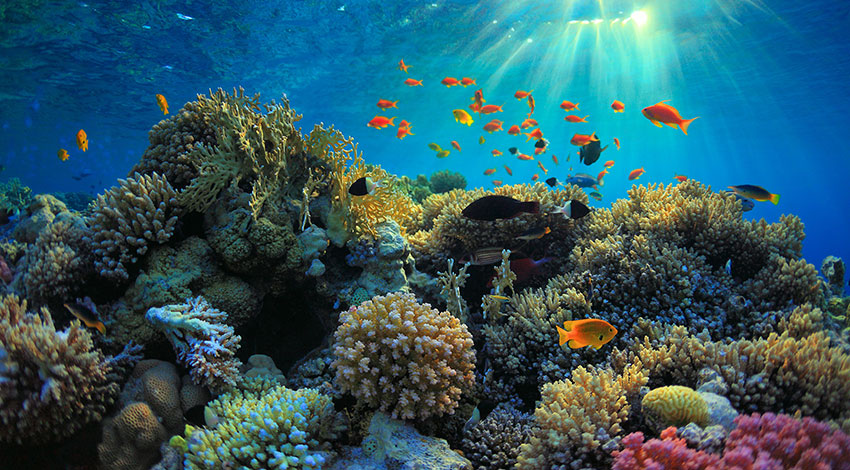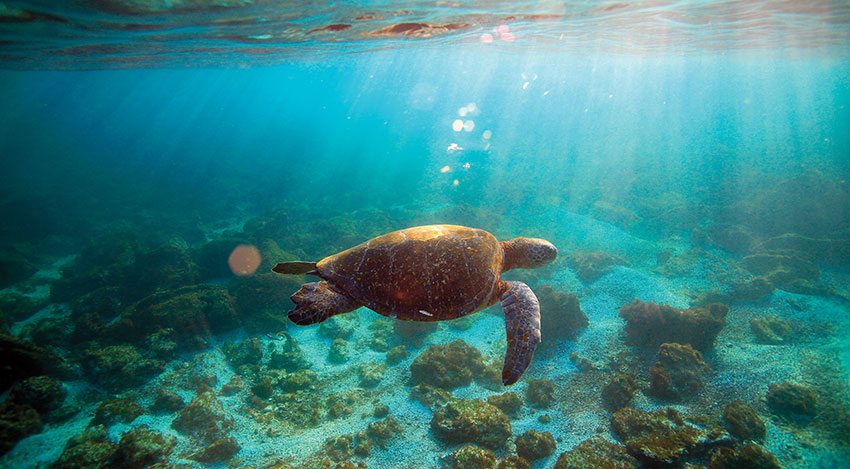Sustainability Series: Why Coral Reefs Are Important & What You Can Do To Save Them
Road Scholar is a nonprofit organization with an educational mission. As we continue on our own journey of discovery to figure out the best ways to promote sustainability on our global campus, one of the goals we have set forth is to provide educational opportunities for our participants to learn about environmental topics. This will be an intrinsic piece of our sustainability mission. This is the first in a series of blogs on environmental topics that will not only provide academic information and context but will also highlight ways that our partner organizations are working to protect our planet. We hope that you, as a traveler and a global citizen, can be a part of this positive change, too!
Have you ever gone snorkeling or diving while you were on a vacation? From Florida to Hawaii, to Mexico, the Galapagos Islands, Australia, and beyond— snorkeling and SCUBA diving can be a wonderful way to explore ocean environments and see aquatic wildlife up close. Coral reefs provide a perfect, visually stunning setting for both snorkelers and divers. We encourage all travelers to be more responsible by not only taking in the visual spectacle, but also learning about the environmental issues of every natural ecosystem one visits.
We asked Heather Hamilton, Certified Florida Master Naturalist, to tell us more about the environmental dangers faced by coral reefs and tips on what you can do to minimize your impacts when you visit them. Read on to learn more!

The Problem
According to The Nature Conservancy, “Coral reefs benefit almost 500 million people and provide habitat for 25% of all marine species.” But, did you know that over 50 percent of the world’s coral reefs have died in the last 30 years? These precious ecosystems are disappearing at an alarming rate!
Coral reefs are under great threat from the environmental impacts of human activity, including global climate change, unsustainable fishing, land-based pollution, population growth, and urban development (which causes erosion). Storm water runoff can carry fertilizers and sewage to the reefs that causes eutrophication, which are dead zones brought on by algal blooms that smother the reefs and remove oxygen from the water. Studies now prove that chemicals in sunblock are affecting the health of the coral reefs. The chemicals can lead to coral bleaching and cause reproductive harm and DNA damage to individual corals and other marine species. Tropical storms, disease outbreaks, invasive species, and other factors add to the threat.
Running from just north of Miami along the coast to Key West, Florida’s Coral Reef is the third-largest barrier reef system in the world and the only barrier coral reef in the continental U.S.. Florida’s reef was once dominated by staghorn and elkhorn corals, but has lost 98% of the population of these two dominant coral species since the 1970s. The staghorn and elkhorn coral species are now included on the Endangered Species list as “Critically Endangered” – one step away from extinction.

Why Should We Care?
Besides enjoying the natural beauty and wonder of corals, people should learn about coral reefs because they are an incredible natural resource that supports marine life, while providing opportunities for recreation, education, scientific research, and public inspiration.
The Florida reef tract extends over 350 nautical miles, and the five counties along that coast are home to over 6 million people whose local “economy and way of life are inextricably linked to the coral reef ecosystem.”
The reefs attract tourists who bolster Florida’s local economy. It’s estimated that Florida's coral reef ecosystem brings more than $1.1 billion to the state through tourism annually, supporting 71,000 jobs in the Sunshine State.
Coral reefs also provide habitat for species that are valuable to commercial and recreational fisheries. The fish Floridians catch and that locals (and visitors) eat rely on corals to build the reef structure where they can breed and grow.
Current medicines that combat cancer, pain, and inflammation have also been derived from coral reef organisms, and reefs also serve as a new frontier for biomedical research.
Finally, coral reefs protect our coastlines. Healthy and resilient coral reefs safeguard against extreme weather, shoreline erosion, and coastal flooding.

Who’s Helping?
Luckily, there are people and organizations out there who are doing things to protect our reefs. One such organization was founded specifically in response to the loss of the elkhorn and staghorn coral: Florida’s Coral Restoration Foundation. They have grown to become the largest Reef Restoration Organization in the world.
How Do They Help?
Coral Restoration Foundation works to support the reefs’ natural recovery processes through the large-scale cultivation, outplanting, and monitoring of genetically diverse, reef-building corals. They have developed a method for “farming” and “outplanting” colonies of staghorn and elkhorn. By hanging finger-sized fragments of these corals to grow on Coral Trees, they produce colonies that are large enough to be outplanted in just six to nine months. To date, Coral Restoration Foundation has restored more than 17,500 square meters of Florida's Coral Reef and are actively restoring coral reefs on a massive scale.
Coral Restoration Foundation also engages and empowers the community to join in helping to save our planet’s coral reefs with dive programs, educational activities, scientific collaborations, and outreach. Additionally, they strive to continue to further coral research and coral reef monitoring techniques.

How Can You Help?
You, too, can take action to protect and restore our coral reefs, as well as the fish, plants, and other animals that depend on them! Here are some ideas:
1. Dive responsibly. Avoid touching reefs or anchoring your boat on the reef. Contact with the reef will damage the delicate coral animals, and anchoring on the reef can kill corals. Use responsible swimming techniques to ensure that your fins never come in contact with the corals.
2. Wear reef-friendly sunscreen. Several common sunscreen ingredients, including oxybenzone, and octinoxate have been shown to be toxic to coral reefs. Sunscreens that use non-nano zinc oxide and titanium dioxide as their active ingredients have not been shown to contribute to coral bleaching. Better yet, try to wear dive skins that protect your body so that you rely less on harmful sunscreens while swimming in the water.
3. Eat sustainable seafood. Research where your seafood comes from and if it's caught sustainably. Seafoodwatch.org is a great resource to determine which species are caught sustainably in your local area.
4. Choose eco-friendly soap products, detergents, and lawn care. You may live thousands of miles from a coral reef, but the products you put on your lawn will eventually flow into the water system. Use green alternatives for fertilizer and pesticides that won’t harm coral reefs and marine life. Microbeads in hand soaps can run through sewer systems and get eaten by fish. The absorbed toxins can transfer up the marine food chain and cause harmful effects on human health.
5. Volunteer. If you live near the coast, volunteer in local beach or reef cleanups. If you don’t live near the coast, get involved in protecting your local watershed, or lakes.
6. Leave no trace. Don't leave unwanted fishing lines, nets, or single use plastics in the water or on the beach. Any kind of litter that pollutes the water column can harm marine wildlife including coral reefs, birds, marine mammals, sea turtles, and fish.
7. Conserve water. Use only the water you need. The less water you use, especially outdoors, the less runoff and wastewater will pollute our oceans.
8. Spread the word. Educate your family and friends about coral reefs and contact your local representatives to see what your state is doing to protect coral reefs.
9. Keep Learning. Watch the movie or read the book: The Secret Life of Corals, or check out the Netflix documentary Chasing Coral. Or, even better, experience the indescribable awe and beauty of these precious ecosystems up close! I would love to have you join me and other experts on a Road Scholar snorkeling program in Florida where we can explore this world together.
Learn more about Road Scholar’s sustainability efforts.
The Author
Heather Hamilton is a Certified Florida Master Naturalist at World Events, LLC and has been a Road Scholar Group Leader for nine years. She is a local expert in birding, snorkeling, and national park excursions in the Southwest and Southeast Florida.
SOURCES
(1) The Nature Conservancy
(2) Secore International
(3) National Oceanic and Atmospheric Administration
(4) Chesapeake Bay Foundation
(5) Environmental Working Group
(6) Coral Restoration Foundation
(7) Natural Resources Defense Council
(8) Coral Restoration Foundation
(9) National Marine Sanctuaries
(10) Florida Department of Environmental Protection
(11) National Ocean Service
(12) National Library of Medicine
(13) National Oceanic and Atmospheric Administration
